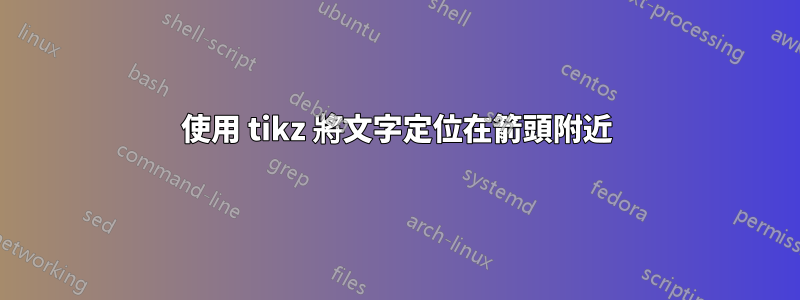
我正在努力讓一些文字出現在用 tikzmark 繪製的箭頭末端的正確位置。程式碼如下
\documentclass{article}
\usepackage[demo]{graphicx}
\usepackage{booktabs}
\usepackage{pgfplots}
\usepackage{tikz}
\usepackage{kbordermatrix}
\usepackage{bigstrut}
\usetikzlibrary{tikzmark,arrows.meta,patterns,calc}
%\newcommand{\tikzmark}[1]{\tikz[overlay,remember picture] \node (#1) {};}
\newcommand{\DrawBox}[4][]{%
\tikz[overlay,remember picture]{%
\coordinate (TopLeft) at ($(pic cs:#2)+(-0.2em,0.9em)$);
\coordinate (BottomRight) at ($(pic cs:#3)+(0.2em,-0.3em)$);
%
\path (TopLeft); \pgfgetlastxy{\XCoord}{\IgnoreCoord};
\path (BottomRight); \pgfgetlastxy{\IgnoreCoord}{\YCoord};
\coordinate (LabelPoint) at ($(\XCoord,\YCoord)!0.5!(BottomRight)$);
%
\draw [red,#1] (TopLeft) rectangle (BottomRight);
\node [below, #1, fill=none, fill opacity=1] at (LabelPoint) {#4};
}
}
\newcommand\DrawArrow[4][]{
\begin{tikzpicture}[
remember picture,
overlay,
arr/.style={draw=gray,line width=2pt, {-latex}, #1},
xshift=1em,
yshift=-3ex,
]
\draw[arr]
([xshift=1ex]pic cs:#2)
to[out=-50,in=-150,looseness=1.0] node[below=0pt] {#4}
([xshift=-1ex]pic cs:#3);
\end{tikzpicture}
}
\newcommand\DrawArrowB[4][]{
\begin{tikzpicture}[
remember picture,
overlay,
arr/.style={draw=gray,line width=2pt, {-latex}, #1},
xshift=-1ex,
yshift=1ex,
]
\draw[arr]
([xshift=-1ex]pic cs:#2)
to[out=-50,in=-150,looseness=1.0] node[below=0pt] {#4}
([xshift=-2ex]pic cs:#3);
\end{tikzpicture}
}
\newcommand\DrawArrowC[4][]{
\begin{tikzpicture}[
remember picture,
overlay,
arr/.style={draw=black,line width=0.5pt, {-latex}, #1},
xshift=1.5ex,
yshift=-0.8ex,
]
\draw[arr]
([xshift=-1ex]pic cs:#2)
to[out=100,in=10,looseness=0] node[below=10pt] {#4}
([xshift=-2ex]pic cs:#3);
\end{tikzpicture}
}
\newcommand\DrawArrowD[4][]{
\begin{tikzpicture}[
remember picture,
overlay,
arr/.style={draw=black,line width=0.5pt, {-latex}, #1},
xshift=1.5ex,
yshift=-0.8ex,
]
\draw[arr]
([xshift=-1ex]pic cs:#2)
to[out=100,in=10,looseness=0] node[below=10pt] {#4}
([xshift=8ex]pic cs:#3);
\end{tikzpicture}
}
\begin{document}
\begin{table}[htbp]
\centering
\caption{Issue 2}
\begin{tabular}{@{}rrrrrrr@{}}
\toprule
& \multicolumn{6}{c}{Development year} \\
\cmidrule(l){2-7}
{Year} & {1} & {2} & {3} & {4} & {5} & {6} \\
\midrule
2009 & \tikzmark{lefta}443 & \tikzmark{leftb}1,136 & 2,128 & 2,898 & 3,403 & 3,873 \\
2009 & 443 & 1,136 & 2,128 & 2,898 & 3,403 & 3,873 \\
2010 & 396 & 1,333 & 2,181 & 2,986 & 3,692 & \\
2011 & 441 & 1,288 & 2,420 & 3,483 & & \\
2012 & 359 & 1,421 & 2,864 & & & \\
2013 & 377\tikzmark{righta} & 1,363\tikzmark{rightb} & & & & \\
2014 & 344& - & - & - & - & - \\
&\phantom{377}\tikzmark{line1end}&\phantom{1,363}\tikzmark{line2end}&&&&\\
\end{tabular}%
\DrawBox[thick, black]{lefta}{righta}{}
\DrawBox[thick, black]{leftb}{rightb}{}
\DrawArrowC{righta}{line1end}{Sum=2,016}
\DrawArrowD{rightb}{line2end}{Sum=6,542}
\label{tab:first two col sums}
\end{table}%
\end{document}
這會產生:
 我希望“Sum=6,542”一詞出現在箭頭下方的中心,但似乎無法將文字移到右側。有人可以幫忙嗎?另外,如果有人有任何更優雅的方法來實現這種類型的標籤,那麼我將很高興看到任何建議。例如,我想知道如果“Sum=...”內容本身位於盒子中是否會看起來更好?
我希望“Sum=6,542”一詞出現在箭頭下方的中心,但似乎無法將文字移到右側。有人可以幫忙嗎?另外,如果有人有任何更優雅的方法來實現這種類型的標籤,那麼我將很高興看到任何建議。例如,我想知道如果“Sum=...”內容本身位於盒子中是否會看起來更好?
非常感謝。
答案1
您的node(在\DrawArrowCandD指令內)處於錯誤的位置。如果你說:
\draw (0,0) -- node{A} (2,0);
預設情況下,如果您放置節點,文字A將放置在midway路徑(在本例中為 at )(1,0)後最後一個座標,預設情況下,它將放置在路徑的最末端,即最後一個輸入座標:
\draw (0,0) -- (2,0) node{A};
在這種情況下A將被放置在(2,0).另一種選擇是透過鍵明確給出節點位置pos,即
\draw node[pos=1]{A} (0,0) -- (2,0);
1路的終點和0起點在哪裡。這會將節點放置在路徑的最末端座標(它的別名是 key at end)。因此,如果您明確地將pos(或其別名之一midway,at start和at end)鍵指定給節點,它將放置在該pos鍵通往的任何位置。
至於你的問題,它看起來怎麼樣,當然是意見問題。在我看來,用 Ti 來做這件事kZ 毀了桌子,排成一行並將總和放入其中,看起來會好得多。
關於所提供的程式碼,我不明白為什麼你會發出這麼多\DrawArrowX命令,它們是相同的命令,只是做了一些小改動。僅使用一種\DrawArrow並大量使用 Ti即可獲得相同的結果kZ 樣式,那麼您無需記住哪個\DrawArrowX是哪個,並且您具有更大的靈活性,因為您可以在文件中更改樣式。該死,您甚至可以將樣式稱為A,B以及修改arr樣式的任何內容,這樣您就不需要多個\DrawArrowX命令了。以下是如何完成此操作的範例:
\documentclass{article}
\usepackage{booktabs}
\usepackage{tikz}
\usetikzlibrary{tikzmark,arrows.meta,patterns,calc}
%\newcommand{\tikzmark}[1]{\tikz[overlay,remember picture] \node (#1) {};}
\newcommand{\DrawBox}[4][]{%
\tikz[overlay,remember picture]{%
\coordinate (TopLeft) at ($(pic cs:#2)+(-0.2em,0.9em)$);
\coordinate (BottomRight) at ($(pic cs:#3)+(0.2em,-0.3em)$);
%
\path (TopLeft); \pgfgetlastxy{\XCoord}{\IgnoreCoord};
\path (BottomRight); \pgfgetlastxy{\IgnoreCoord}{\YCoord};
\coordinate (LabelPoint) at ($(\XCoord,\YCoord)!0.5!(BottomRight)$);
%
\draw [red,#1] (TopLeft) rectangle (BottomRight);
\node [below, #1, fill=none, fill opacity=1] at (LabelPoint) {#4};
}
}
\tikzset{arr draw/.style={draw=gray,line width=2pt,-latex},
arr to/.style={out=-50,in=-150},
arr node/.style={below=1mm, inner sep=1pt}}
\newcommand\DrawArrow[4][]{
\begin{tikzpicture}[remember picture,overlay, #1]
\draw[arr draw] (pic cs:#2) to[arr to] (pic cs:#3) node[arr node] {#4};
\end{tikzpicture}
}
\begin{document}
\begin{table}[htbp]
\centering
\caption{Issue 2}
\begin{tabular}{@{}rrrrrrr@{}}
\toprule
& \multicolumn{6}{c}{Development year} \\
\cmidrule(l){2-7}
{Year} & {1} & {2} & {3} & {4} & {5} & {6} \\
\midrule
2009 & \tikzmark{lefta}443 & \tikzmark{leftb}1,136 & 2,128 & 2,898 & 3,403 & 3,873 \\
2009 & 443 & 1,136 & 2,128 & 2,898 & 3,403 & 3,873 \\
2010 & 396 & 1,333 & 2,181 & 2,986 & 3,692 & \\
2011 & 441 & 1,288 & 2,420 & 3,483 & & \\
2012 & 359 & 1,421 & 2,864 & & & \\
2013 & 377\tikzmark{righta} & 1,363\tikzmark{rightb} & & & & \\
2014 & 344& - & - & - & - & - \\
&\phantom{377}\tikzmark{line1end}&\phantom{1,363}\tikzmark{line2end}&&&&\\
\end{tabular}%
\DrawBox[thick, black]{lefta}{righta}{}
\DrawBox[thick, black]{leftb}{rightb}{}
% You can change the all the "arr's" styles globally by using \tikzset
% in the middle of the document, then all \DrawArrow commands will follow such style
% or locally through the optional argument of \DrawArrow, then just that command will follow that sytle.
\DrawArrow[arr to/.style={bend left}, arr draw/.style={->}, arr node/.style={left, font=\tiny}]{righta}{line1end}{Sum=2,016}
\DrawArrow{rightb}{line2end}{Sum=6,542}
\label{tab:first two col sums}
\end{table}%
\end{document}


